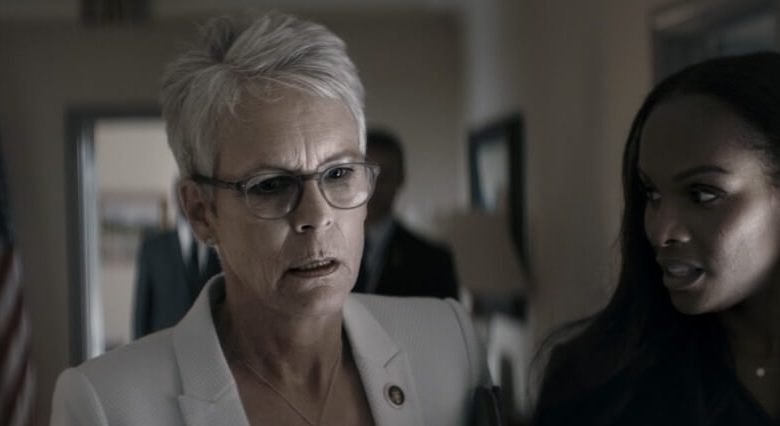
Hollywood raged against both President George W. Bush and the Iraq War for years until studios realized no one wanted to see more movies on the subject.
Think commercial duds like “Green Zone,” “Redacted,” “Grace is Gone,” “In the Valley of Elah” and “Lions for Lambs,” even if the latter focused more on the Afghanistan battles.
Along comes “An Acceptable Loss,” and it’s like filmmakers want to dredge up those Bush-Cheney arguments anew.
- “Manufactured” intelligence
- Taking the fight to the terrorists
- War hawks on the march
Only “Loss” adds a layer of intellectual absurdity those films lacked. You’ll laugh when you’re not rolling your eyes.
Tika Sumpter (“Southside with You”) stars as Libby, a bright, beautiful professor at generic Grant University. Only Libby is much more than that. She once played a critical role in a foreign policy decision that divided the nation.
We’ll say no more because the details are kept hidden for quite some time. Suffice to say some students aren’t too pleased to see her arrive on campus.
The story shifts back in time to show Libby plotting with a major political figure (Jamie Lee Curtis). We get a gaggle of banal dialogue, including Curtis repeatedly stating, “the stars have aligned,” to defend her strategic play.
It’s a “boo! hiss!” role far beneath Curtis’ talents.
RELATED: The Great Iraq War Movie Scam
Meanwhile, one dogged student (Ben Tavassoli) is stalking Libby day and night. What could this young Middle Eastern man want?
Writer/director Joe Chappelle (“Halloween: The Curse of Michael Myers”) churns out a political thriller with all the gravitas of a TV film project – circa 1998. Everything about “Loss” reeks of small budget storytelling. That once would doom a fair number of projects.
Today? Many filmmakers stretch their dollars out to craft smart, sophisticated yarns. At a time when filmmakers create heralded work on iPhones, budgetary excuses only go so far.
FAST FACT: Tika Sumpter struggled financially in her 20s before landing a four-year contract for the soap opera “One Life to Live.”
It’s hard to tally up all the absurdities dragging down “An Acceptable Loss.” Let’s start with a college inviting Libby to teach on campus in the first place given her background. Snowflakes students wouldn’t have it.
Or how Libby eschews not just technology but email, cell phones and more. She’d make an Amish farmer blush with envy.
“How do you connect with the world,” someone asks Libby.
“Slowly,” she replies.
Oh.
From there the conversation dovetails into spoiler territory. The movie suggests a key tactical strike can literally end the War on Terror.
Really? The war involving rogue agents spread across the globe? The one where one side doesn’t wear a uniform? The kind of asymmetrical warfare where new enemies pop up each week?
That one.
“We can end this thing once and for all,” someone says. That dialogue, along with other snippets, is so “on the nose” you can spot the nostril hairs.
FAST FACT: Director Joe Chappelle’s eclectic career includes time directing excellent TV shows like “The Wire” along with genre films fare like “Phantoms” and “The Skulls II.”
We’re even treated to the old line, “you’re either with us or against us.” The quote, along with the movie’s ideological instincts, sound as if it were unearthed from a 2004 time capsule.
Need a Trump era connection? Libby’s father holds the one job you expect him to have, given the film’s leanings.
To be fair, “An Acceptable Loss” regularly puts key characters in jeopardy, allowing us to stay engaged on a pedestrian level. The film also packs a large surprise in the waning minutes, a twist that’s more challenging than expected given the story’s modest ambitions.
.@jamieleecurtis on her new film, “An Acceptable Loss”: “We’ve hit a sort of nuclear indifference in the world. And we have to be very, very, very wary of that nuclear indifference.” pic.twitter.com/qL4eYuSRny
— Christiane Amanpour (@camanpour) January 14, 2019
Chappelle’s screenplay, to its credit, doesn’t trot out pat ideological labels. Audiences may suss out the parties involved. Still, kudos for not going down that all too obvious road.
Otherwise, “Loss” squanders a magnetic lead and a geopolitical reality demanding far more finesse than shown here.
HiT or Miss: “An Acceptable Loss” would fit in with bland TV movies of yore. In 2019, audiences deserve, and expect, far more.
